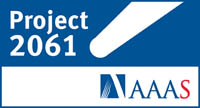U.S. Department of Education Funds Project 2061’s New Curriculum Development Effort
Analyzing the content and quality of instructional materials and their impact on students and teachers has been a major part of Project 2061’s work for more than a decade.
- View Project 2061’s textbook evaluation reports.
- View article on analyzing textbook coherence published in Jan. 2010 issue of Journal of Research on Science Teaching.
Now, with a new grant from the U.S. Department of Education, Project 2061 will have the opportunity to apply much of what it has learned to the development of two new units for instruction in middle school science. The new three-year, $2.44 million grant is funded through the Department of Education’s Institute of Education Sciences and brings together Project 2061’s expertise in science education research and that of BSCS, the well-known science curriculum development organization based in Colorado Springs.
Making Sense of Chemical Reactions
Designed to help middle school students build the strong foundation that is needed for success in high school and college level biology, each two-week unit will replace or supplement the instructional materials that teachers are currently using. The new units will focus on core chemistry and biochemistry ideas that research has shown to be particularly difficult for many students, even after instruction. By helping students develop a conceptual model of “molecular rearrangement” to explain chemical reactions in both physical and life science contexts, the units will enable them to better understand a wide range of phenomena involving chemical change, from the oxidation of metals to photosynthesis and growth in plants.
Given that modern biology has become increasingly chemical in nature, “students who are not able to relate basic molecular principles to the functions of living systems will be at a significant disadvantage when it comes to more advanced work in high school and beyond,” says Jo Ellen Roseman, Project 2061 director and principal investigator for the new study. “We think our approach to teaching these ideas at the middle school level will be a major step forward.”
The process for developing the new units will involve teachers and students in Colorado; Washington; DC, Maryland; and Massachusetts. Using interviews, classroom observations, test results, and expert analysis, the research team will gather multiple types of feedback on the units so that they can be revised and refined. The project will culminate with a field test in which teachers new to the study will try out the units in their classrooms, and their students will be tested to see if they have made gains in their learning. Student assessments developed by Project 2061 through an NSF-funded effort will play an important role in helping the research team determine what students have learned, where they are having problems, and how to improve the effectiveness of the units.
Read more on the AAAS Web site.
# # #
For more information, please contact:
Project 2061 Director: Dr. Jo Ellen Roseman, (202) 326-6752
Also in the August 2010 issue:






